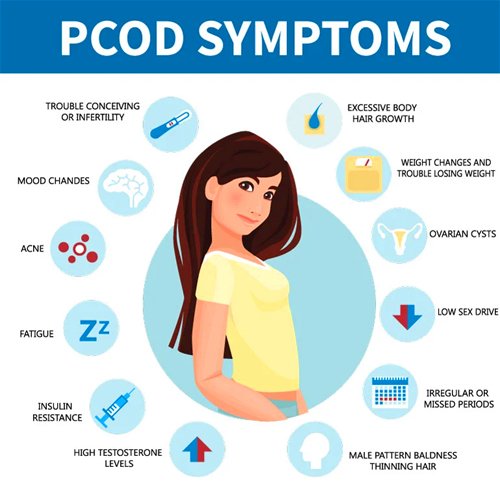
Polycystic Ovary Syndrome (PCOS) is a prevalent hormonal disorder among women of reproductive age. It is a complex condition influenced by various factors, making its exact cause multifaceted and not entirely understood. PCOS is characterized by hormonal imbalances, irregular periods, and the development of small cysts on the ovaries.
Hormonal Imbalance and PCOD
One of the primary contributing factors to PCOD is hormonal imbalance. An increase in androgen
levels, such as testosterone, can disrupt the normal function of ovaries, leading to irregular
ovulation.
Genetics and PCOD
Genetic predisposition also plays a role in the development of PCOD. Individuals with a family
history of the condition are more likely to experience its symptoms.
Lifestyle Factors
Certain lifestyle choices, including unhealthy eating habits, sedentary lifestyles, and stress,
can exacerbate hormonal imbalances and contribute to PCOD development.
Insulin Resistance and PCOD
Insulin resistance, where the body's cells do not respond effectively to insulin, is closely linked to
PCOD. High insulin levels can stimulate excess androgen production, disrupting ovulation.
Excessive Androgen Production
Increased levels of androgens, often referred to as male hormones, can hinder the release of eggs from
the ovaries and cause the characteristic symptoms of PCOD.
Inflammation and PCOD
Chronic inflammation within the body can also contribute to PCOD. Elevated levels of inflammation may
affect ovarian function and insulin resistance.
Dr. Nivedita Sinha excels in Obstetrics & Gynecology, offering exceptional care, expertise, and personalized solutions for women's health and well-being with unparalleled dedication.
Years Of Experience
MBBS, MS - Obstetrics & Gynaecology
Experienced Doctor's
Dr. Nivedita Sinha did her MBBS from reputedLady Hardinge Medical College, Delhi and MS (OBS & GYNAE) from UCMS & GTB Hospital, DELHI.
Happy Patients
She is highly specialized in managing high Pregnancy, Infertility, and delivering babies normally.
Choose Dr. Nivedita Sinha for exceptional Obstetrics & Gynaecology care. Expertise, compassion, and personalized attention for your health needs. Trust in our specialized care.
"Reliable Care, Ensuring Safety Always."
"Precision in Surgery, Expertise in Care."
"Round-the-Clock Care You Can Trust."
"Your Path to Health, Our Expertise in Medicine."
Antenatal care is the care you get from health professionals during your pregnancy. It's sometimes called pregnancy care or maternity care. You'll be offered appointments with a midwife, or sometimes a doctor who specialises in pregnancy and birth (an obstetrician).
Fear increases tension which increases pain. If you can stay somewhat relaxed in the face of strong contractions, you'll have less resistance to opening up for the baby to come out. Rhythmic breathing, meditation self-hypnosis, and other relaxation techniques are excellent tools for all stages of labor.
You won't feel any pain during the C-section, although you may feel sensations like pulling and pressure. Most women are awake and simply numbed from the waist down using regional anesthesia (an epidural and/or a spinal block) during a C-section.

Polycystic Ovary Syndrome (PCOS) is a prevalent hormonal disorder affecting women of reproductive age. It's characterized by hormonal imbalances that lead to various physical and emotional symptoms. Understanding PCOD and its implications is crucial for affected individuals and those around them.
PCOD, or Polycystic Ovary Syndrome, is a complex hormonal disorder affecting the ovaries, leading to irregular menstrual cycles and potential difficulties with fertility. It involves an imbalance of reproductive hormones, with elevated levels of androgens (male hormones) affecting the regular release of eggs from the ovaries.
The exact cause of PCOD remains unknown, but factors such as genetics, insulin resistance, and hormonal imbalances contribute to its development. Lifestyle factors, including poor diet and inadequate exercise, might also exacerbate the condition.
Symptoms of PCOD vary widely among individuals. Common signs include irregular periods, excessive hair growth (hirsutism), acne, weight gain, and difficulty conceiving. The severity and combination of symptoms differ from person to person.
Hormonal Imbalance
PCOD disrupts the normal hormonal balance in the body, leading to increased androgen levels. This
imbalance can affect the menstrual cycle, causing irregular periods or even the absence of menstruation
(amenorrhea).
Women with PCOD often experience irregular menstrual cycles, characterized by infrequent or prolonged periods. These irregularities can impact overall health and fertility.
PCOD is a leading cause of infertility among women due to irregular ovulation or the lack of ovulation. Difficulty in conceiving can be distressing for those aspiring to start a family.
Lifestyle Changes
Adopting a healthy lifestyle, including regular exercise and a balanced diet, plays a pivotal role in
managing PCOD. Weight management and reducing stress levels are essential for improving symptoms.
Dietary Modifications
Certain dietary modifications, such as reducing refined carbohydrates and sugars, can help regulate
insulin levels, potentially alleviating symptoms associated with PCOD.
Medical Treatments
Medical interventions may include hormone-regulating medications, oral contraceptives, and medications
to induce ovulation, aiming to manage specific symptoms and improve fertility.
Emotional Impact
Living with PCOD can have a profound emotional impact. Coping with the physical symptoms, fertility
challenges, and societal pressures may lead to stress, anxiety, or depression.
Coping Strategies
Building a support network, seeking counseling, practicing mindfulness techniques, and engaging in
hobbies can assist in coping with the emotional toll of PCOD.
Support Networks
Joining support groups or seeking guidance from healthcare professionals and counselors can provide
valuable emotional and informational support for individuals dealing with PCOD.
Professional Guidance
Consulting with healthcare providers specializing in reproductive health or endocrinology is crucial for
tailored management plans and monitoring of PCOD symptoms.
"The patient expresses concerns, symptoms, and history for thorough assessment, aiding in accurate diagnosis and personalized treatment by medical professionals."
Proactively revolutionize granular customer service after pandemic internal or "organic" sources istinctively impact proactive human